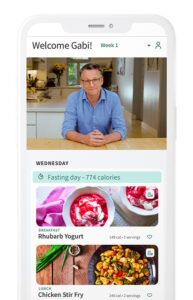Ever heard of intermittent fasting (IF) but unsure what it entails? You’re not alone. Dr. Michael Mosley, a leading advocate for IF, shed light on this popular dietary approach and answered some of the most common questions.
Michael, for someone who’s never tried IF, tell us what it is?
Intermittent fasting is a catch-all term that describes a very wide range of dietary approaches, but which broadly means giving your body time out from endless eating. As well as the 5:2™ diet (where you cut your calories two days a week) there is Time Restricted Eating where you cut the hours within which you eat. Numerous studies have shown it is a safe and effective way to help people lose weight, maintain weight, and/or get control of their blood sugar levels. Combined with a relatively low carb mediterranean-style diet, it’s also an effective strategy to fend off winter weight gain.

Talk us through it:
What is the best length and why? 12, 16 or 20 hours?
The 5:2™ diet involves two “fasting” days per week, where you consume about 800 calories of Mediterranean-style food and eat sensible portions of similar food with no caloric restriction for the remaining five days.
Popular forms of TRE are 12:12 (eat for 12 hours, fast for 12) or 14:10 (eat for 10 hours, fast for 14). While some people choose to practise 16:8 TRE, it is often unsustainable long-term and in order to suit your lifestyle. 12:12, where you might stop eating by 8pm and not eat again until 8am, provides a good balance between maintainability and health benefits. That said, much of the current research focuses on 14:10
What to expect as we fast? By grazing all day or only briefly while we sleep, our bodies are forced continually to process the nutrients and toxins in our food, with little break. However, when we fast, our bodies get a chance to rest and repair. Yes, you may feel a bit hungry as your body adjusts to fasting, but you will find that it keeps your energy levels steady, increases your concentration levels and aids better sleep.
When should we start – e.g. is it better to skip breakfast or dinner? It really depends on what works for you and your lifestyle. Personally, I am a breakfast person and tend to wake up hungry, so I would prefer to have breakfast and finish eating 3 hours before going to bed.
Should we still exercise? There is some evidence that working out in a fasted state may be more effective in using fat as an energy source, however the differences are marginal. Working out fasted vs. non fasted is completely up to you and how you feel, some people love it but some people find it really tough. The most important thing is doing the workout, regardless of time in the day.
Can we still work and be productive? Absolutely. Fasting is also beneficial for your brain health so once your body is used to it, you may find that you are even more productive.
Ok .. it’s over… how should we break our fast? Your first meal after fasting should be something well balanced that will fuel you well and provide sustained energy. Protein is a must, ideally 20g or more, and higher fibre is also a good idea. Including healthy fats in your first meal will help to prolong the energy release as well. An omelette is one of my go-to breakfasts as it’s quick and easy to make, plus I add leftover roasted veg.
How often should we do it? You can do the 5:2 and TRE as a way of life. The Fast 800 also has The Very Fast 800 approach (available in Keto too), where you cut your calories all week whilst eating a moderately low carb mediterranean-style diet. For this approach, I would recommend no more than 12 weeks or until you’ve reached your goal weight, whatever comes first.
Outside of weight loss, what other benefits can it provide?
There is a lot of evidence for the benefits of intermittent fasting, if it is done properly. As well as helping with weight loss, studies have shown that it can improve sleep, blood sugar levels, blood pressure and mental health. I have a TV series you can watch on SBS On Demand called ‘Australia’s Health Revolution with Dr Michael Mosley’ if you’re interested in learning more.
Is there anyone who shouldn’t do it – e.g. girls when menstruating?
Intermittent fasting is a safe and effective approach for most people. However, If you are on medication, are pregnant, breastfeeding, underweight or have a history with eating disorders, you should speak with your GP for support and guidance first. You can find out more by visiting The Fast 800 website. thefast800.com

Your menstrual cycle can be affected by fasting, so it is important to pay close attention to your cycle as you make any dietary changes. TRE is usually well tolerated and unlikely to affect hormones through the majority of your cycle; but in the week leading up to menstruation, when progesterone is higher, fasting can disrupt hormones.
Lastly, can you tell us about your app – Fast 800? What does it include?
With The Fast 800 app, signing up for the personalised programme is the gateway to better health. You can access nutritionally-designed meal plans, a comprehensive library of over 700 recipes, guided workouts, mindfulness and support from health coaches. Our programme has already impacted over 100,000 lives.
A few key features include:
• Three flexible approaches to suit individual goals including, The Very Fast 800 (also available in keto), The New 5:2™ and the Way Of Life.
• Structured exercise plans to suit different fitness levels: beginner to advanced with chair-based options for those with reduced mobility.
• Library of workouts including Pilates, Yoga, stretching, resistance and HIIT, and guided meditations
• Weekly meal plans (recipes can be substituted based on personal preferences)
• Automated shopping list (number of servings can be increased if cooking for more people).
• Track key health metrics such as weight, waist, HBA1C, sleep and mood to see progress over time.
• Health support from The Fast 800’s comprehensive list of health coaches
• Daily reading and library of additional educational content
• A live community where health coaches support members, facilitate discussions and run events.
• Changing habits course designed by a team of qualified psychotherapists

Dr Michael Mosley was a TV science presenter, journalist and co-founder of one of the world’s most popular diet and lifestyle programmes, The Fast 800. He became famous for his evidence-based approach to weight loss for better health, which encompasses intermittent fasting, the mediterranean-style diet and mindfulness. He was also well known for helping people achieve better sleep. thefast800.com
For the full article grab the June/July 2024 issue of Women’s Fitness Australia from newsagents and convenience locations. Subscribe here.






